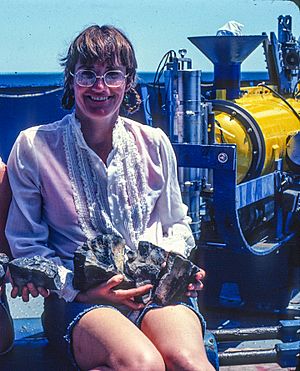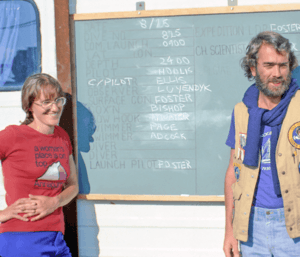Tanya Atwater facts for kids
Quick facts for kids
Tanya Marie Atwater
|
|
|---|---|

Tanya Atwater on the Galapagos Propagating Rift expedition, 1982.
|
|
| Born | 1942 Los Angeles, California
|
| Nationality | American |
| Education | Scripps Institution of Oceanography |
| Scientific career | |
| Fields | Tectonics Marine geophysics |
| Institutions | University of California, Santa Barbara |
| Thesis | Implications of Plate Tectonics for the Cenozoic Tectonic Evolution of Western North America (1972) |
Tanya Atwater (born 1942) is an American geophysicist and marine geologist. She is famous for her work on plate tectonics, which is the study of how Earth's large land plates move. She is especially known for her early research about the history of plate movements in western North America.
Contents
Early Life and Learning
Tanya Atwater was born in Los Angeles, California in 1942. Her father was an engineer, and her mother was a botanist. Tanya Atwater was one of the first women to study the ocean floor and its geology.
She started her college education in 1960. She earned her first degree in geophysics from the University of California, Berkeley in 1965. Later, she received her Ph.D. in marine geophysics in 1972. This degree was from Scripps Institution of Oceanography, which is part of the University of California, San Diego.
Tanya Atwater became a professor at the Massachusetts Institute of Technology. In 1980, she joined the faculty at the University of California, Santa Barbara (UCSB). She retired from UCSB in 2007. Today, she is an emerita professor of geological sciences. She also directs the Educational Multimedia Visualization Center at UCSB.
Her Work and Discoveries
Tanya Atwater was a professor of tectonics at the University of California, Santa Barbara. She wrote or helped write many articles in science journals and reports. Her important work led to her becoming a Fellow of the American Geophysical Union in 1975. This honor recognized her contributions to tectonophysics, which is the study of forces that shape Earth's crust.
In 1984, she won an award from the Association for Women Geoscientists. She is also a member of the U.S. National Academy of Sciences. This means she is one of the top scientists in the country. In 2019, she received the Penrose Medal, the highest award from the Geological Society of America. In 2022, she received the Wollaston Medal from the Geological Society of London, which is also a very high honor.
Exploring the Ocean Floor
Tanya Atwater took part in many ocean trips to explore the ocean floor. She used special tools that could be towed deep underwater. She even made 12 dives herself in a deep-ocean submarine called Alvin.
She studied how new ocean crust is made at places called seafloor spreading centers. These are like underwater mountain ranges where Earth's plates pull apart. In 1968, she helped write a paper about how these spreading centers are often broken by faults.
She also played a key role in expeditions that found unique living things near warm springs on the ocean floor. These discoveries led to finding very hot "black smokers." These are undersea hydrothermal vents that shoot out hot, mineral-rich water.
Understanding Plate Movements
Tanya Atwater studied "propagating rifts" near the Galápagos Islands. She found that these rifts form when spreading centers on the seafloor are disturbed. This can happen because of plate movement or magma (melted rock). When disturbed, the spreading centers have to change direction. This discovery helped explain the complicated patterns found on the ocean floor.
She is perhaps most famous for her work on the plate tectonic history of western North America. She wrote important papers that explained how the plates moved in this region. Her work helped us understand the history of the San Andreas Fault.
She also studied how global plate movements connect with regional geology. She found links that explained how many large features on Earth were formed. These include the Rocky Mountains, Yellowstone, Death Valley, Cascade volcanoes, and the California Coast Ranges.
Her research paper, "Implications of Plate Tectonics for the Cenozoic Tectonic Evolution of Western North America," created the main framework for understanding plate tectonics in this area. In her work, she explained that about 40 million years ago, a plate called the Farallon plate was sliding under the North American plate and the Pacific plate. The lower part of the Farallon plate completely slid under Southern California. The upper part did not sink and is now known as the Juan de Fuca plate. Because the southern Farallon plate disappeared, the boundary in Southern California became directly between the Pacific plate and the North American plate. The San Andreas Fault is special because it is a major fault line and also the border between these two large plates. She updated this important work in 1989.
Tanya Atwater is also very interested in sharing knowledge and teaching. She has created electronic multimedia tools. These tools help people visualize and understand the history of tectonic plates better.
Awards and Honors
- 1975, Fellow, American Geophysical Union
- 1980, AAAS Newcomb Cleveland Prize for a top research article in the journal Science
- 1997, Elected to the National Academy of Sciences
- 2002, National Science Foundation Director's Award for Distinguished Teaching Scholars. This award helps scientists share their research in education.
- Leopold von Buch Medal, German Geosciences Society
- 2005 Gold Medal, Society of Woman Geographers
- 2019 Penrose Medal of the Geological Society of America.
- 2022 Wollaston Medal of the Geological Society of London.
- 2023 Elected to the American Academy of Arts and Sciences.
See also
 In Spanish: Tanya Atwater para niños
In Spanish: Tanya Atwater para niños
- Triple junction
- Project FAMOUS
 | Anna J. Cooper |
 | Mary McLeod Bethune |
 | Lillie Mae Bradford |


